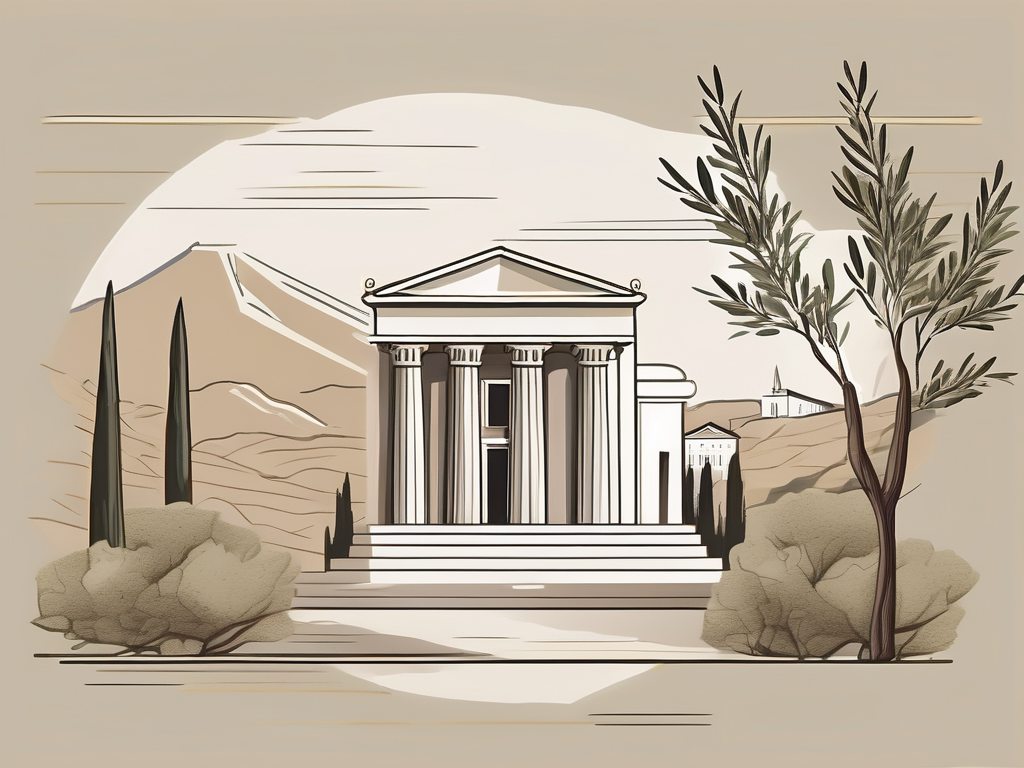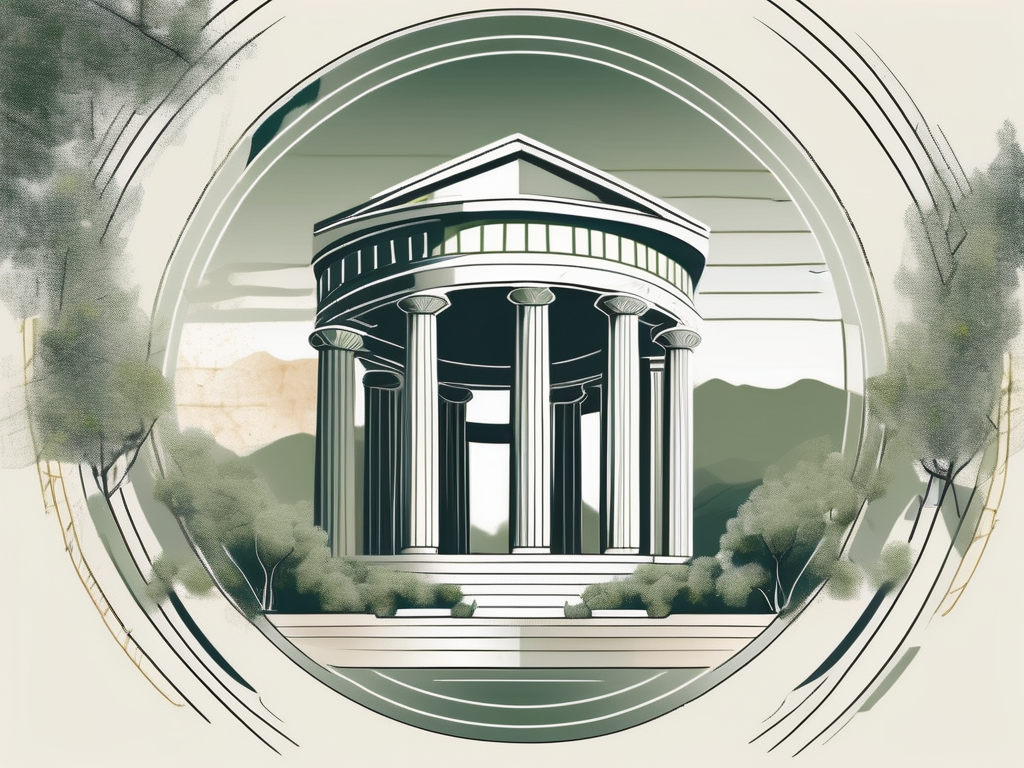Stoicism, a philosophical school originating in ancient Greece, had a profound impact on the society and culture of ancient Rome. This article explores the various aspects of Stoicism’s influence in Rome, ranging from its core principles to its integration into the Roman education system. The enduring legacy of Stoic philosophy in Rome is also examined, along with its lasting impact on later Roman and Western philosophy.
Understanding Stoicism: A Brief Overview
Stoicism is a philosophy that emphasizes the human capacity for virtue and the importance of living in accordance with nature. Developed in Athens by Zeno of Citium around 300 BCE, Stoicism quickly gained popularity in Rome due to its practical approach to ethics and personal development. The Stoics believed that virtue, or moral excellence, is the highest good that one can attain.
The Stoics also emphasized the importance of accepting what is beyond our control and focusing on what we can control, namely our thoughts, actions, and attitudes. This philosophy encouraged individuals to cultivate inner tranquility and find contentment by aligning their desires with the natural order of the universe.
The Core Principles of Stoicism
Stoicism is characterized by a set of core principles that guided the daily lives of its adherents:
- Virtue as the highest good: The Stoics believed that virtue, or moral excellence, is the ultimate goal of life. It is through the practice of virtue that one achieves inner peace and lives in harmony with the universe.
- Acceptance of fate: Stoicism teaches the acceptance of events outside of our control. By focusing on what we can control and accepting the rest, we can find tranquility even in the face of adversity.
- Living in accordance with nature: The Stoics believed that living in harmony with nature and the natural order of the universe is crucial for leading a meaningful and fulfilling life.
The Origins of Stoicism in Ancient Greece
Stoicism originated in ancient Greece and was first introduced to Rome in the 2nd century BCE. Its teachings were greatly influenced by the works of Greek philosophers such as Socrates, Plato, and Aristotle. The Stoics sought to synthesize these philosophical ideas into a practical system that could guide individuals towards virtuous living.
Zeno of Citium, the founder of Stoicism, established the first Stoic school in Athens. His teachings attracted many Roman students and philosophers who later spread Stoicism throughout the Roman Empire.
One of the key influences on Stoicism was the philosophy of Socrates. Socrates believed that the pursuit of knowledge and self-examination were essential for personal growth and moral development. The Stoics adopted this belief and incorporated it into their own philosophy, emphasizing the importance of self-reflection and the examination of one’s own thoughts and actions.
Another influential figure in the development of Stoicism was Plato. Plato’s ideas about the nature of reality and the existence of a higher truth resonated with the Stoics, who believed in the existence of a divine order that governs the universe. They saw virtue as aligning oneself with this divine order and living in accordance with its principles.
Aristotle, a student of Plato, also had a significant impact on Stoic philosophy. His emphasis on the cultivation of moral virtues and the pursuit of eudaimonia, or flourishing, aligned closely with Stoic teachings. The Stoics believed that by living a virtuous life, one could achieve a state of inner tranquility and find true happiness.
As Stoicism spread throughout the Roman Empire, it gained popularity among both the elite and the common people. The practical nature of Stoic philosophy appealed to individuals from all walks of life, as it offered a guide for living a meaningful and fulfilling life in the face of challenges and adversity.
Stoicism continued to influence Western thought throughout history, with notable figures such as Marcus Aurelius, Seneca, and Epictetus being prominent Stoic philosophers. Today, Stoicism remains relevant as a philosophy that encourages individuals to focus on what they can control, cultivate inner peace, and live in accordance with nature.
Stoicism’s Arrival in Ancient Rome
Early Adopters and Promoters
The adoption of Stoicism by influential Roman figures played a crucial role in its spread and acceptance within Roman society. Prominent statesmen, such as Cato the Younger and Seneca the Younger, embraced Stoic principles and became influential proponents of the philosophy.
Cato the Younger, known for his unwavering commitment to moral integrity, embodied the Stoic ideal of living virtuously. He believed that true happiness could only be achieved by living in accordance with nature and reason. Cato’s steadfast adherence to Stoic principles made him a revered figure among his peers and a source of inspiration for many aspiring Stoics.
Seneca the Younger, an advisor to Emperor Nero, emphasized the importance of self-control and self-discipline in achieving happiness and tranquility. He believed that by mastering one’s desires and emotions, individuals could free themselves from the turmoil of external circumstances. Seneca’s teachings resonated with many Romans, who sought inner peace and stability amidst the chaos of the empire.
The Integration of Stoicism into Roman Society
Stoicism gradually became integrated into various aspects of Roman society, including politics, ethics, and daily life. Roman leaders adopted Stoic principles in their decision-making process, emphasizing the importance of justice, wisdom, and courage.
Emperor Marcus Aurelius, a renowned Stoic philosopher and ruler, exemplified the integration of Stoicism into Roman politics. His Meditations, a collection of personal reflections, showcased his commitment to Stoic principles and his belief in the importance of moral virtue in leadership. Marcus Aurelius’ reign marked a period of Stoic influence in Roman governance, as he sought to rule with wisdom, fairness, and compassion.
Stoicism also had a significant influence on Roman moral philosophy, which sought to provide a framework for ethical behavior in a rapidly changing society. The Stoic teachings on personal morality and the pursuit of virtue resonated with many Romans, offering guidance on how to navigate the complexities of daily life.
In addition to politics and ethics, Stoicism found its way into the fabric of Roman daily life. Stoic practices, such as the contemplation of death and the acceptance of fate, provided individuals with a sense of perspective and resilience. Stoics believed that by acknowledging the inevitability of death and embracing the uncertainty of life, one could find inner peace and live in harmony with the natural order of the universe.
Furthermore, Stoicism influenced Roman literature and art, with Stoic themes and ideas being incorporated into various works. Poets and playwrights, such as Seneca the Younger, explored Stoic concepts in their writings, using them as a means to convey moral lessons and philosophical insights to their audience.
Overall, Stoicism’s arrival in ancient Rome was not merely a philosophical trend, but a transformative force that shaped the mindset and values of Roman society. Through the influence of early adopters and the integration of Stoic principles into various aspects of Roman life, Stoicism became a prominent and enduring philosophy that left an indelible mark on the history of ancient Rome.
The Impact of Stoicism on Roman Philosophy and Thought
Stoicism and Roman Moral Philosophy
Stoicism greatly influenced Roman moral philosophy, shaping the ethical theories and practices of prominent Roman thinkers. The Stoic emphasis on virtue as the highest good and the acceptance of external circumstances provided a framework for moral decision-making.
Roman moralists, such as Cicero and Marcus Aurelius, incorporated Stoic principles into their writings, advocating for personal virtue, self-control, and the pursuit of wisdom. Their works became essential readings for students and intellectuals in Rome, perpetuating the influence of Stoicism throughout Roman society.
One of the key aspects of Stoicism that resonated with Roman moral philosophy was its emphasis on the cultivation of virtue. Stoics believed that the path to a good life lay in living virtuously, and this idea deeply influenced Roman thinkers. Cicero, a renowned Roman philosopher, embraced Stoic principles and argued that virtue was the foundation of moral excellence. He believed that by cultivating virtues such as wisdom, justice, courage, and temperance, individuals could lead a meaningful and fulfilling life.
Another important aspect of Stoicism that shaped Roman moral philosophy was its emphasis on self-control. Stoics believed that individuals should strive to achieve inner tranquility by exercising self-control over their emotions and desires. This idea resonated with Roman thinkers who sought to cultivate discipline and restraint in their personal lives. Marcus Aurelius, the Stoic emperor, exemplified this principle in his Meditations, where he reflected on the importance of self-control in maintaining inner peace and moral integrity.
Stoicism’s Influence on Roman Political Thought
Stoicism had a profound impact on Roman political thought, shaping the ideals and actions of Roman leaders. Stoic principles aligned with the Stoicism’s values of justice and fairness, influencing Roman legal systems and governance.
Marcus Aurelius, the Stoic emperor who ruled during the height of the Roman Empire, exemplified the integration of Stoic philosophy into political leadership. His Meditations, a collection of personal reflections on Stoic philosophy, provide insights into his commitment to virtue and the well-being of his empire.
Stoicism’s influence on Roman political thought extended beyond Marcus Aurelius. Roman leaders, such as Seneca the Younger, also embraced Stoic principles in their governance. Seneca, a prominent Stoic philosopher and advisor to Emperor Nero, emphasized the importance of justice and fairness in political decision-making. He believed that leaders should prioritize the well-being of their subjects and act with integrity and moral virtue.
Furthermore, Stoicism influenced the development of Roman legal systems. The Stoic emphasis on justice and fairness contributed to the establishment of laws that aimed to uphold these principles. Roman jurists, influenced by Stoic philosophy, sought to create a legal framework that promoted equality and protected the rights of individuals.
In conclusion, Stoicism had a profound impact on Roman philosophy and thought. Its influence can be seen in the moral theories and practices of Roman thinkers, as well as in the ideals and actions of Roman leaders. Stoicism’s emphasis on virtue, self-control, and justice shaped Roman moral philosophy and political thought, leaving a lasting legacy in Roman society.
Stoicism and the Roman Education System
The Role of Stoicism in Roman Scholarly Institutions
Stoicism became an integral part of the Roman education system, shaping the intellectual and moral development of young Romans. It was taught in prestigious institutions such as the Collegium Augustalium and the Imperial Academy, where students learned about Stoic principles alongside other philosophical disciplines.
Within these esteemed institutions, Stoic philosophers served as influential teachers and mentors, guiding students on the path towards personal virtue and moral excellence. They imparted wisdom and encouraged critical thinking, fostering a deep understanding of Stoic principles and their practical application in daily life.
Students engaged in lively discussions and debates, exploring the tenets of Stoicism and examining their relevance to the challenges faced by Roman society. Through these intellectual exercises, young Romans developed a profound appreciation for the Stoic philosophy and its potential to shape their character and actions.
Stoic Teachings in Everyday Education
In addition to formal education, Stoic teachings permeated everyday Roman life. Parents and elders passed on Stoic principles to their children, reinforcing the importance of values such as self-control and resilience. Stoicism provided a moral compass for individuals at all levels of Roman society, offering guidance on how to face challenges and navigate the complexities of daily life.
Children were taught to embrace the Stoic concept of “virtue as the highest good,” emphasizing the importance of cultivating wisdom, justice, courage, and temperance. They were encouraged to develop a strong sense of self-discipline, recognizing that true happiness lies in the pursuit of moral excellence rather than external possessions or circumstances.
Stoic principles were integrated into various aspects of Roman education, including physical training and the arts. Students were taught to apply Stoic teachings in their athletic pursuits, learning to endure physical hardships with grace and resilience. In the realm of arts, Stoicism influenced the creation of literature, poetry, and drama, with many works exploring themes of personal growth, inner strength, and the triumph of the human spirit.
Furthermore, Stoicism played a significant role in shaping the ethical framework of Roman society. It provided a common language and set of values that transcended social divisions, fostering a sense of unity and shared purpose. Stoic ideals influenced the behavior of Roman citizens, promoting a sense of civic duty, integrity, and moral responsibility.
In conclusion, Stoicism not only found its place within the formal education system of ancient Rome but also permeated the fabric of everyday life. It served as a guiding philosophy, instilling in young Romans a deep sense of personal virtue and moral integrity. Stoic principles continue to inspire individuals today, reminding us of the enduring wisdom and relevance of this ancient philosophy.
The Legacy of Stoicism in Rome
The Enduring Influence of Stoic Philosophy
Stoic philosophy’s enduring influence in ancient Rome can be seen in the cultural, political, and intellectual legacy it left behind. Stoic ideas shaped Roman ethical thought, governance, and education, becoming an integral part of Roman identity.
Moreover, Stoicism’s emphasis on personal virtue and the pursuit of reason resonated with individuals from all walks of life. Stoic teachings provided solace and guidance during times of personal hardship and societal upheaval.
Stoicism’s Impact on Later Roman and Western Philosophy
The influence of Stoicism did not end with ancient Rome. Its ideas continued to permeate Western philosophy, with notable thinkers such as René Descartes and Immanuel Kant drawing inspiration from Stoic principles.
Stoicism’s enduring legacy can be seen in its impact on modern psychology, cognitive-behavioral therapy, and mindfulness practices. The Stoic emphasis on self-reflection, resilience, and acceptance of things outside our control still resonates with individuals seeking inner peace and personal growth today.
In conclusion, Stoicism’s influence in ancient Rome was far-reaching, shaping the ethical, political, and educational landscapes of the time. Through its core principles and the teachings of influential Stoic thinkers, Stoicism left an indelible mark on Roman philosophy and remains a source of inspiration for individuals seeking a meaningful and virtuous life.












